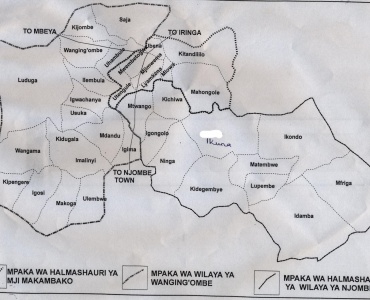Beekeeping unit is among of 19 departments in Njombe district council established by government in the year 2012 as independent unit for the aim of improving service delivery and fast development of beekeeping sector. Beekeeping is one of the economic activities in Njombe District Council. It is among the councils in Tanzania that are known for honey and bee-wax production. Natural forests and plantation forests available in most parts of the district council have great potential for beekeeping. Beekeeping offers a particularly useful possibility for poor and landless farmers to gain income as it requires minimal start up investment. In addition to the direct income from bee products, beekeeping generates off-farm employment opportunities in many fields including hive carpentry, honey trading and bee-based micro-enterprises. Beekeeping also supports agricultural production, forestry, and maintenance of biodiversity and natural resources through pollination services. But there are many factors that need to be addressed so that farmers and others can make the most of the potential of beekeeping to provide income for families and communities and to contribute to rural development in general.
The beekeeping policy (1998) emphasizes much on encouraging the participation of all stakeholders in conserving, managing honeybees, individual beekeepers and organized communities to establish, manage and own apiaries for demonstration purposes and carrying out sustainable beekeeping activities, furthermore the policy calls for financial facilities to attach and opportunities for establishing credit schemes to beekeepers.
The major functions of the unit are:
· To supervise the establishments of bee Apiaries and bee reserve,
· To coordination, supervision implementation of beekeeping policy, regulation, raw and beekeeping guidelines.
· To identification of beekeeping opportunity and encouraging community to invest in beekeeping sector and management of quality bee product.
· To encourage and capacitate community to evolve in beekeeping sector for improvement of community livelihood.
Njombe district is one among the districts under Beekeeping Improvement Programme (BIP) in Tanzania initiated by Ministry of Natural resources and Tourism in 2006. The object of the programme was support the development of beekeeping sector. The district is highly potential in beekeeping industry having potential areas ranging from lower altitude zones mostly occupied by Miombo woodlands to higher altitude zones mostly occupied by shrubs, trees and grasslands which both opens opportunities to beekeeping investments. Njombe district council has about 23 beekeeping groups and about 270 individual beekeepers that are operating in different villages. The district with about 5750 beehives of which 2384 are Modern beehives while 3366 are traditional hives. The productivity of the hives has been affected by the traditional methods which have little increased from 10995.9 Kg of Honey and 873 Kg of beeswax in 2013 to 12,916.6 Kg of Honey and 973.5 Kg of beeswax in year 2015. This bee product currently contributes a total of Tsh 110,147,300 to Njombe communities per year. The decrease in bee products harvesting has merely been caused by an increased number of traditional beekeeping (i.e use of traditional beehives) as compared to Modern beehives usage, and the majority are unaware on Modern beekeeping techniques including usage of modern beekeeping equipments, processing and packaging.
Honey bees species potentials commonly found in Njombe are stinging and non-stinging bees which are dwelling in tree curve found in conserved forest, houses roofs, spaced rocks, opened holes in soil and are catch when placed with beehives and domesticated for production bee product. Beekeeping sub-sector has improved as a result of intensive campaign conducted by the Njombe DC under the sponsorship of Tanzania Social Action Fund (TASAF) and Participatory Forest Management (PFM).

Halmashauri ya Wilaya ya Njombe, Mtaa wa Kidegembye,Barabara ya Lupembe
Anuani ya Posta: S.L.P 547 Njombe
Namba ya Simu: +255 26 2782111
Simu Kiganjani:
Barua pepe: ded@njombedc.go.tz
Haki Miliki@2017 Halmashauri ya Wilaya ya Njombe. Haki zote zimehifadhiwa